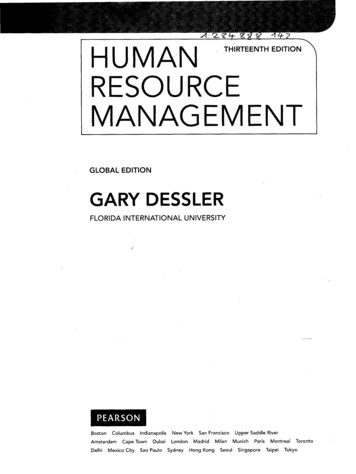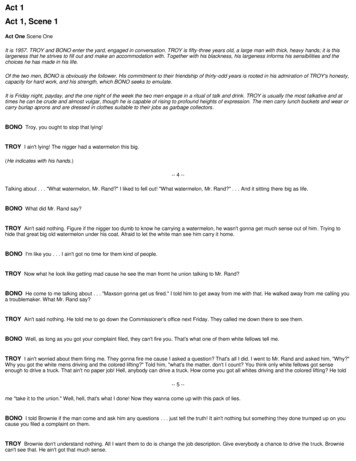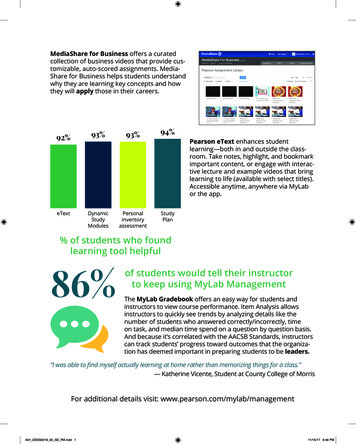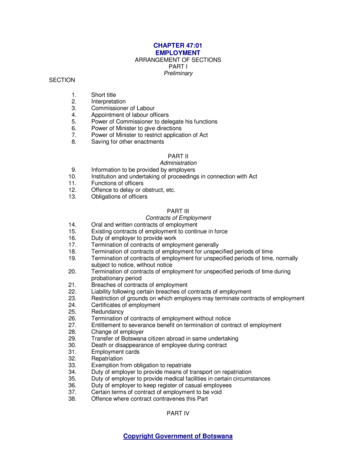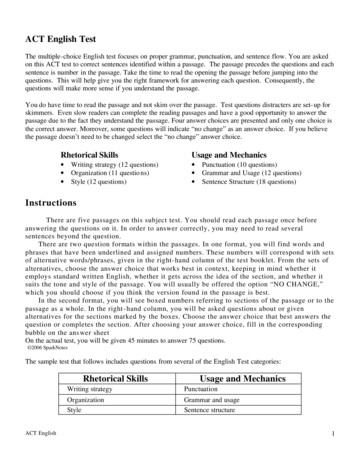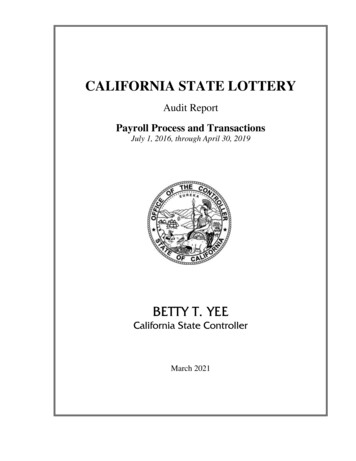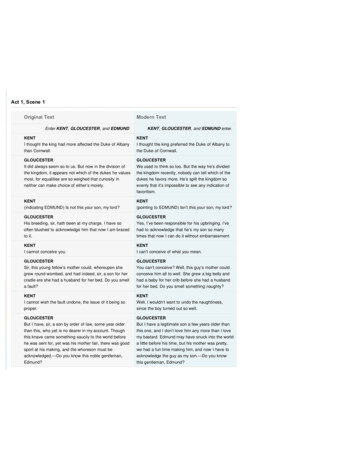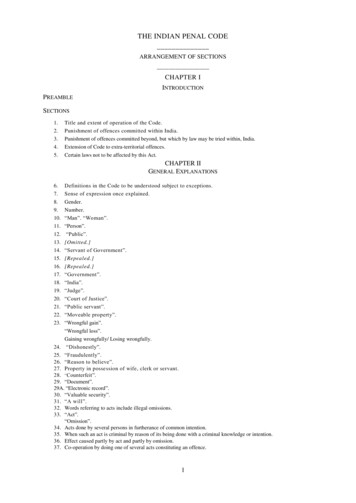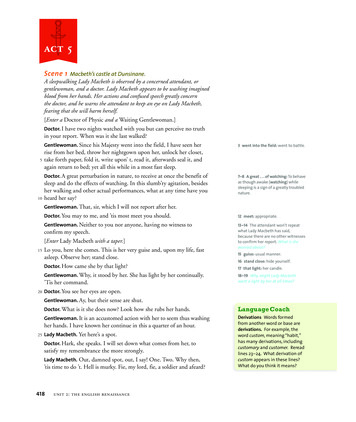
Transcription
act 5Scene 1510152025Macbeth’s castle at Dunsinane.A sleepwalking Lady Macbeth is observed by a concerned attendant, orgentlewoman, and a doctor. Lady Macbeth appears to be washing imaginedblood from her hands. Her actions and confused speech greatly concernthe doctor, and he warns the attendant to keep an eye on Lady Macbeth,fearing that she will harm herself.[Enter a Doctor of Physic and a Waiting Gentlewoman.]Doctor. I have two nights watched with you but can perceive no truthin your report. When was it she last walked?Gentlewoman. Since his Majesty went into the field, I have seen herrise from her bed, throw her nightgown upon her, unlock her closet,take forth paper, fold it, write upon’ t, read it, afterwards seal it, andagain return to bed; yet all this while in a most fast sleep.Doctor. A great perturbation in nature, to receive at once the benefit ofsleep and do the effects of watching. In this slumb’ry agitation, besidesher walking and other actual performances, what at any time have youheard her say?Gentlewoman. That, sir, which I will not report after her.Doctor. You may to me, and ’tis most meet you should.Gentlewoman. Neither to you nor anyone, having no witness toconfirm my speech.[Enter Lady Macbeth with a taper.]Lo you, here she comes. This is her very guise and, upon my life, fastasleep. Observe her; stand close.Doctor. How came she by that light?Gentlewoman. Why, it stood by her. She has light by her continually.’Tis her command.Doctor. You see her eyes are open.Gentlewoman. Ay, but their sense are shut.Doctor. What is it she does now? Look how she rubs her hands.Gentlewoman. It is an accustomed action with her to seem thus washingher hands. I have known her continue in this a quarter of an hour.Lady Macbeth. Yet here’s a spot.Doctor. Hark, she speaks. I will set down what comes from her, tosatisfy my remembrance the more strongly.Lady Macbeth. Out, damned spot, out, I say! One. Two. Why then,’tis time to do ’t. Hell is murky. Fie, my lord, fie, a soldier and afeard?4183 went into the field: went to battle.7–8 A great . . . of watching: To behaveas though awake (watching) whilesleeping is a sign of a greatly troublednature.12 meet: appropriate.13–14 The attendant won’t repeatwhat Lady Macbeth has said,because there are no other witnessesto confirm her report. What is sheworried about?15 guise: usual manner.16 stand close: hide yourself.17 that light: her candle.18–19 Why might Lady Macbethwant a light by her at all times?Language CoachDerivations Words formedfrom another word or base arederivations. For example, theword custom, meaning “habit,”has many derivations, includingcustomary and customer. Rereadlines 23–24. What derivation ofcustom appears in these lines?What do you think it means?unit 2: the english renaissanceNA L12PE-u02s26-Act5.indd41811/24/1011:43:03 AM
Macduff and MacbethNA L12PE-u02s26-Act5.indd41911/24/1011:43:13 AM
3035404550556065What need we fear who knows it, when none can call our power toaccount? Yet who would have thought the old man to have hadso much blood in him? aDoctor. Do you mark that?Lady Macbeth. The Thane of Fife had a wife. Where is she now? What,will these hands ne’er be clean? No more o’ that, my lord, no more o’that. You mar all with this starting.Doctor. Go to, go to. You have known what you should not.Gentlewoman. She has spoke what she should not, I am sure of that.Heaven knows what she has known.Lady Macbeth. Here’s the smell of the blood still. All the perfumes ofArabia will not sweeten this little hand. O, O, O!Doctor. What a sigh is there! The heart is sorely charged.Gentlewoman. I would not have such a heart in my bosom for thedignity of the whole body.Doctor. Well, well, well.Gentlewoman. Pray God it be, sir.Doctor. This disease is beyond my practice. Yet I have known thosewhich have walked in their sleep, who have died holily in their beds.Lady Macbeth. Wash your hands. Put on your nightgown. Look not sopale. I tell you yet again, Banquo’s buried; he cannot come out on ’sgrave.Doctor. Even so?Lady Macbeth. To bed, to bed. There’s knocking at the gate. Come,come, come, come. Give me your hand. What’s done cannot beundone. To bed, to bed, to bed.[Lady Macbeth exits.]Doctor. Will she go now to bed?Gentlewoman. Directly.Doctor. Foul whisp’rings are abroad. Unnatural deedsDo breed unnatural troubles. Infected mindsTo their deaf pillows will discharge their secrets.More needs she the divine than the physician.God, God forgive us all. Look after her.Remove from her the means of all annoyanceAnd still keep eyes upon her. So good night.My mind she has mated, and amazed my sight.I think but dare not speak.Gentlewoman.Good night, good doctor.[They exit.]420a TRAGEDYReread lines 28–32, in whichLady Macbeth relives how shepersuaded her husband tomurder Duncan. What appearsto have happened to LadyMacbeth as a result of their plot?34–36 Lady Macbeth shows guiltabout Macduff’s wife. Then sheaddresses her husband, as if he werehaving another ghostly fit (starting).42 sorely charged: heavily burdened.43–44 The gentlewoman says thatshe would not want Lady Macbeth’sheavy heart in exchange for beingqueen.47 practice: skill.50 on ’s: of his.52 What has the doctor learned so farfrom Lady Macbeth’s ramblings?58 Foul whisp’rings are abroad:Rumors of evil deeds are circulating.61 She needs a priest more than adoctor.63 annoyance: injury. The doctormay be worried about the possibilityof Lady Macbeth’s committingsuicide.65 mated: astonished.unit 2: the english renaissanceNA L12PE-u02s26-Act5.indd42011/24/1011:43:18 AM
Scene 2510152025The country near Dunsinane.The Scottish rebels, led by Menteith, Caithness, Angus, and Lennox, havecome to Birnam Wood to join Malcolm and his English army. They knowthat Dunsinane has been fortified by a furious and brave Macbeth. Theyalso know that his men neither love nor respect him.[Drum and Colors. Enter Menteith, Caithness, Angus, Lennox,and Soldiers.]Menteith. The English power is near, led on by Malcolm,His uncle Siward, and the good Macduff.Revenges burn in them, for their dear causesWould to the bleeding and the grim alarmExcite the mortified man.Angus.Near Birnam WoodShall we well meet them. That way are they coming.Caithness. Who knows if Donalbain be with his brother?Lennox. For certain, sir, he is not. I have a fileOf all the gentry. There is Siward’s sonAnd many unrough youths that even nowProtest their first of manhood.Menteith.What does the tyrant?Caithness. Great Dunsinane he strongly fortifies.Some say he’s mad; others that lesser hate himDo call it valiant fury. But for certainHe cannot buckle his distempered causeWithin the belt of rule.Angus.Now does he feelHis secret murders sticking on his hands.Now minutely revolts upbraid his faith-breach.Those he commands move only in command,Nothing in love. Now does he feel his titleHang loose about him, like a giant’s robeUpon a dwarfish thief.Menteith.Who, then, shall blameHis pestered senses to recoil and startWhen all that is within him does condemnItself for being there?Caithness.Well, march we onTo give obedience where ’tis truly owed.Meet we the med’cine of the sickly weal,And with him pour we in our country’s purgeEach drop of us.3–5 for their dear . . . man: The causeof Malcolm and Macduff is so deeplyfelt that a dead (mortified) manwould respond to their call to arms(alarm).10–11 many . . . manhood: manysoldiers who are too young to growbeards (unrough)—that is, who havehardly reached manhood.15–16 Like a man so swollen withdisease (distempered) that he cannotbuckle his belt, Macbeth cannotcontrol his evil actions.18 Every minute, the revoltsagainst Macbeth shame him for histreachery (faith-breach).22–25 Macbeth’s troubled nerves(pestered senses)—the product of hisguilty conscience—have made himjumpy.25–29 Caithness and the others willgive their loyalty to the only help(med’cine) for the sick country (weal).They are willing to sacrifice theirlast drop of blood to cleanse (purge)Scotland.macbeth: act five, scene 2NA L12PE-u02s26-Act5.indd42142111/24/1011:43:19 AM
30Lennox.Or so much as it needsTo dew the sovereign flower and drown the weeds.Make we our march towards Birnam.[They exit marching.]29–31 Lennox compares Malcolmto a flower that needs the blood ofpatriots to water (dew) it and drownout weeds like Macbeth.Scene 3510152025Dunsinane. A room in the castle.Macbeth awaits battle, confident of victory because of what he learnedfrom the witches. After hearing that a huge army is ready to march uponhis castle, he expresses bitter regrets about his life. While Macbeth preparesfor battle, the doctor reports that he cannot cure Lady Macbeth, whoseillness is mental, not physical.[Enter Macbeth, the Doctor, and Attendants.]Macbeth. Bring me no more reports. Let them fly all.Till Birnam Wood remove to DunsinaneI cannot taint with fear. What’s the boy Malcolm?Was he not born of woman? The spirits that knowAll mortal consequences have pronounced me thus:“Fear not, Macbeth. No man that’s born of womanShall e’er have power upon thee.” Then fly, false thanes,And mingle with the English epicures.The mind I sway by and the heart I bearShall never sag with doubt nor shake with fear.[Enter Servant.]The devil damn thee black, thou cream-faced loon!Where got’st thou that goose-look?Servant. There is ten thousand—Macbeth.Geese, villain?Servant.Soldiers, sir.Macbeth. Go prick thy face and over-red thy fear,Thou lily-livered boy. What soldiers, patch?Death of thy soul! Those linen cheeks of thineAre counselors to fear. What soldiers, whey-face?Servant. The English force, so please you.Macbeth. Take thy face hence.[Servant exits.]Seyton!—I am sick at heartWhen I behold—Seyton, I say!—This pushWill cheer me ever or disseat me now.I have lived long enough. My way of lifeIs fall’n into the sere, the yellow leaf,And that which should accompany old age,As honor, love, obedience, troops of friends,4221 Macbeth wants no more newsof thanes who have gone toMalcolm’s side.2–10 Macbeth will not be infected(taint) with fear, because the witches(spirits), who know all humanevents (mortal consequences), haveconvinced him that he is invincible.He mocks the self-indulgent English(English epicures), then swears thathe will never lack confidence.11 loon: stupid rascal.12 goose-look: look of fear.14–17 Macbeth suggests that theservant cut his face so that blood willhide his cowardice. He repeatedlyinsults the servant, calling him acoward (lily-livered) and a clown(patch) and making fun of his whitecomplexion (linen cheeks, whey-face).20–28 This push . . . dare not: Theupcoming battle will either makeMacbeth secure (cheer me ever) ordethrone (disseat) him. He bitterlycompares his life to a withered (sere)leaf. He cannot look forward to oldage with friends and honor, but onlyto curses and empty flattery (mouthhonor, breath) from those too timid(the poor heart) to tell the truth.unit 2: the english renaissanceNA L12PE-u02s26-Act5.indd42211/24/1011:43:20 AM
303540455055I must not look to have, but in their steadCurses, not loud but deep, mouth-honor, breathWhich the poor heart would fain deny and dare not.—Seyton![Enter Seyton.]Seyton. What’s your gracious pleasure?Macbeth.What news more?Seyton. All is confirmed, my lord, which was reported.Macbeth. I’ll fight till from my bones my flesh be hacked.Give me my armor.Seyton.’Tis not needed yet.Macbeth. I’ll put it on.Send out more horses. Skirr the country round.Hang those that talk of fear. Give me mine armor.—How does your patient, doctor?Doctor.Not so sick, my lord,As she is troubled with thick-coming fanciesThat keep her from her rest.Macbeth.Cure her of that.Canst thou not minister to a mind diseased,Pluck from the memory a rooted sorrow,Raze out the written troubles of the brain,And with some sweet oblivious antidoteCleanse the stuffed bosom of that perilous stuffWhich weighs upon the heart? bDoctor.Therein the patientMust minister to himself.Macbeth. Throw physic to the dogs, I’ll none of it.—Come, put mine armor on. Give me my staff.[Attendants begin to arm him.]Seyton, send out.—Doctor, the thanes fly from me.—Come, sir, dispatch.—If thou couldst, doctor, castThe water of my land, find her disease,And purge it to a sound and pristine health,I would applaud thee to the very echoThat should applaud again.—Pull ’t off, I say.—What rhubarb, senna, or what purgative drugWould scour these English hence? Hear’st thou of them?Doctor. Ay, my good lord. Your royal preparationMakes us hear something.L 5bLanguage CoachDenotation/Connotation Theimages or feelings associatedwith a word are itsconnotations. Reread line 32.The word hacked has severalsynonyms, including choppedand sliced. What connotationsor feelings accompany hackedand its synonyms?35 skirr: scour.b TRAGEDYIn lines 39–45, Macbeth asksthe doctor to remove the sorrowfrom Lady Macbeth’s memoryand relieve her overburdenedheart. Why are these lines somoving?47–54 Macbeth has lost his faith inthe ability of medicine (physic) to helphis wife. Then as he struggles into hisarmor, he says that if the doctor coulddiagnose Scotland’s disease (cast. . . land) and cure it, Macbeth wouldnever stop praising him.54 Pull ’t off: Macbeth is referring toa piece of armor.56 scour: purge; them: the English.macbeth: act five, scene 3NA L12PE-u02s26-Act5.indd42342311/24/1011:43:20 AM
Bring it after me.—I will not be afraid of death and baneTill Birnam Forest come to Dunsinane.Doctor. [Aside] Were I from Dunsinane away and clear,Profit again should hardly draw me here.[They exit.]Macbeth.6058–60 Macbeth leaves for battle,telling Seyton to bring the armor.He declares his fearlessness beforedeath and destruction (bane).Scene 4The country near Birnam Wood.The rebels and English forces have met in Birnam Wood. Malcolm orderseach soldier to cut tree branches to camouflage himself. In this way BirnamWood will march upon Dunsinane.5101520[Drum and Colors. Enter Malcolm, Siward, Macduff, Siward’s son,Menteith, Caithness, Angus, and Soldiers, marching.]Malcolm. Cousins, I hope the days are near at handThat chambers will be safe.Menteith.We doubt it nothing.Siward. What wood is this before us?Menteith.The wood of Birnam.Malcolm. Let every soldier hew him down a boughAnd bear ’t before him. Thereby shall we shadowThe numbers of our host and make discoveryErr in report of us. cSoldiers.It shall be done.Siward. We learn no other but the confident tyrantKeeps still in Dunsinane and will endureOur setting down before ’t.Malcolm.’Tis his main hope;For, where there is advantage to be given,Both more and less have given him the revolt,And none serve with him but constrainèd thingsWhose hearts are absent too.Macduff.Let our just censuresAttend the true event, and put we onIndustrious soldiership.Siward.The time approachesThat will with due decision make us knowWhat we shall say we have and what we owe.Thoughts speculative their unsure hopes relate,But certain issue strokes must arbitrate;Towards which, advance the war.[They exit marching.]424cFORESHADOWINGIn lines 4–7, Malcolm orders hismen to cut down tree branchesto camouflage themselves andconfuse Macbeth’s scouts. Howwill this affect the prophecyabout Birnam Wood?10 setting down: siege.10–14 Malcolm says that men ofall ranks (both more and less) haveabandoned Macbeth. Only weakmen who have been forced intoservice remain with him.14–16 Macduff warns againstoverconfidence and advises that theyattend to the business of fighting.16–21 Siward says that the approaching battle will decide whether theirclaims will match what they actuallypossess (owe). Right now, their hopesand expectations are the product ofguesswork (thoughts speculative);only fighting (strokes) can settle(arbitrate) the issue.unit 2: the english renaissanceNA L12PE-u02s26-Act5.indd42411/24/1011:43:22 AM
Behind the Cross-Cultural AdaptationsCurtainmedacbeth, perfor: The Zulu Menter in 1997at Lincoln CUmabathaAkira Kurosawa’s 1957 filmThrone of BloodRL 7With its universal themes of ambition andguilt, Macbeth is often reimagined in othercultural settings. These photos show aZulu version of the play, set in South Africa;a famous film adaptation, Throne of Blood,set in medieval Japan; and a version setamong the Tlingit, an Alaskan native tribe.Notice how the settings and costumes,such as the Japanese statue and samuraidress in the middle photo, reflect thesedifferent cultural contexts.Cross-cultural productions may evenreinterpret the play to comment onbroader political issues, such as in Tlingitadaptation of Macbeth. In Tlingit culture,one should always value the welfare of thetribe above one’s own interests. Macbethclearly favors his own desires at theexpense of his countrymen’s lives. In theTlinglit Macbeth, when characters adheredto communal values, those cast membersspoke in the language of the Tlingit; whenthey voiced individual concerns, they spokeShakespearean English. According to theTlingit adaptation of Macbeth, English isthe language of selfish individuality andviolence, while Tlingit is the language oftribal unity and peace.If you could choose to set Macbeth inanother cultural setting, what would it be?How would you adjust the set, costumes,or other aspects of the play to reflect thiscultural setting?ny of Juneau, AlaskaMacbeth, performed in 2004 by the Perseverance Theatre Compamacbeth: act five, scene 4NA L12PE-u02s26-Act5.indd42542511/24/1011:43:25 AM
Scene 5510152025Dunsinane. Within the castle.Convinced of his powers, Macbeth mocks the enemy; his slaughters haveleft him fearless. News of Lady Macbeth’s death stirs little emotion, onlya comment on the emptiness of life. However, when a messenger reportsthat Birnam Wood seems to be moving toward the castle, Macbeth growsagitated. Fearing that the prophecies have deceived him, he decides toleave the castle to fight and die on the battlefield.[Enter Macbeth, Seyton, and Soldiers, with Drum and Colors.]Macbeth. Hang out our banners on the outward walls.The cry is still “They come!” Our castle’s strengthWill laugh a siege to scorn. Here let them lieTill famine and the ague eat them up.Were they not forced with those that should be ours,We might have met them dareful, beard to beard,And beat them backward home.[A cry within of women.]What is that noise?Seyton. It is the cry of women, my good lord. [He exits.]Macbeth. I have almost forgot the taste of fears.The time has been my senses would have cooledTo hear a night-shriek, and my fell of hairWould at a dismal treatise rouse and stirAs life were in ’t. I have supped full with horrors.Direness, familiar to my slaughterous thoughts,Cannot once start me.[Enter Seyton.]Wherefore was that cry?Seyton. The Queen, my lord, is dead.Macbeth. She should have died hereafter.There would have been a time for such a word.Tomorrow and tomorrow and tomorrowCreeps in this petty pace from day to day dTo the last syllable of recorded time,And all our yesterdays have lighted foolsThe way to dusty death. Out, out, brief candle!Life’s but a walking shadow, a poor playerThat struts and frets his hour upon the stageAnd then is heard no more. It is a taleTold by an idiot, full of sound and fury,Signifying nothing. e[Enter a Messenger.]Thou com’st to use thy tongue: thy story quickly.4264 ague: fever.5–7 Macbeth complains that theattackers have been reinforced(forced) by deserters (those thatshould be ours), which has forcedhim to wait at Dunsinane instead ofseeking victory on the battlefield.9–15 There was a time when ascream in the night would havefrozen Macbeth in fear and aterrifying tale (dismal treatise)would have made the hair on his skin(fell of hair) stand on end. But sincehe has fed on horror (direness), itcannot stir (start) him anymore.17–18 Macbeth wishes that his wifehad died later (hereafter), when hewould have had time to mourn her.d BLANK VERSETap your foot to the rhythm asyou read aloud lines 19–20. Howdoes the rhythm of the linesmirror their meaning?eTRAGEDYReread lines 24–28, in whichMacbeth compares life to anactor with a small part to play.How does he probably view hisambitions now? Describe theemotions he inspires in you.unit 2: the english renaissanceNA L12PE-u02s26-Act5.indd42611/24/1011:43:32 AM
3035404550Messenger. Gracious my lord,I should report that which I say I saw,But know not how to do ’t.Macbeth.Well, say, sir.Messenger. As I did stand my watch upon the hill,I looked toward Birnam, and anon methoughtThe wood began to move.Macbeth.Liar and slave!Messenger. Let me endure your wrath, if ’t be not so.Within this three mile may you see it coming.I say, a moving grove.Macbeth.If thou speak’st false,Upon the next tree shall thou hang aliveTill famine cling thee. If thy speech be sooth,I care not if thou dost for me as much.—I pull in resolution and beginTo doubt th’ equivocation of the fiend,That lies like truth. “Fear not till Birnam WoodDo come to Dunsinane,” and now a woodComes toward Dunsinane. —Arm, arm, and out!—If this which he avouches does appear,There is nor flying hence nor tarrying here.I ’gin to be aweary of the sunAnd wish th’ estate o’ th’ world were now undone.—Ring the alarum bell! —Blow wind, come wrack,At least we’ll die with harness on our back. f[They exit.]Scene 65Dunsinane. Before the castle.Malcolm and the combined forces reach the castle, throw away theircamouflage, and prepare for battle.[Drum and Colors. Enter Malcolm, Siward, Macduff, and their army,with boughs.]Malcolm. Now near enough. Your leafy screens throw downAnd show like those you are. —You, worthy uncle,Shall with my cousin, your right noble son,Lead our first battle. Worthy Macduff and weShall take upon ’s what else remains to do,According to our order.Siward.Fare you well.Do we but find the tyrant’s power tonight,Let us be beaten if we cannot fight.38–52 The messenger’s news hasdampened Macbeth’s determination(resolution); Macbeth begins to fearthat the witches have tricked him (todoubt th’ equivocation of the fiend).His fear that the messenger tells thetruth (avouches) makes him decideto confront the enemy instead ofstaying in his castle. Weary of life, henevertheless decides to face deathand ruin (wrack) with his armor(harness) on.fTRAGEDYReread lines 47–52. Note thatMacbeth vows to take action,which will probably lead to thedrama’s catastrophe, or tragicresolution. What is the likelyoutcome of his action?1–6 Malcolm commands thetroops to put down their branches(leafy screens) and gives the battleinstructions.7 power: forces.macbeth: act five, scene 6NA L12PE-u02s26-Act5.indd42742711/24/1011:43:32 AM
Macduff. Make all our trumpets speak; give them all breath,10Those clamorous harbingers of blood and death.[They exit. Alarums continued.]10 harbingers: announcers.Scene 7Another part of the battlefield.Macbeth kills young Siward, which restores his belief that he cannot bekilled by any man born of a woman. Meanwhile, Macduff searches forthe hated king. Young Siward’s father reports that Macbeth’s soldiershave surrendered and that many have even joined their attackers.5101520[Enter Macbeth.]Macbeth. They have tied me to a stake. I cannot fly,But, bear-like, I must fight the course. What’s heThat was not born of woman? Such a oneAm I to fear, or none.[Enter Young Siward.]Young Siward. What is thy name?Macbeth.Thou’lt be afraid to hear it.Young Siward. No, though thou call’st thyself a hotter nameThan any is in hell.Macbeth.My name’s Macbeth.Young Siward. The devil himself could not pronounce a titleMore hateful to mine ear.Macbeth.No, nor more fearful.Young Siward. Thou liest, abhorrèd tyrant. With my swordI’ll prove the lie thou speak’st.[They fight, and Young Siward is slain.]Macbeth.Thou wast born of woman.But swords I smile at, weapons laugh to scorn,Brandished by man that’s of a woman born. [He exits.] g[Alarums. Enter Macduff.]Macduff. That way the noise is. Tyrant, show thy face!If thou beest slain, and with no stroke of mine,My wife and children’s ghosts will haunt me still.I cannot strike at wretched kerns, whose armsAre hired to bear their staves. Either thou, Macbeth,Or else my sword with an unbattered edgeI sheathe again undeeded. There thou shouldst be;By this great clatter, one of greatest noteSeems bruited. Let me find him, Fortune,And more I beg not.[He exits. Alarums.]4281–4 Macbeth compares himself toa bear tied to a post (a reference tothe sport of bearbaiting, in which abear was tied to a stake and attackedby dogs).g FORESHADOWINGBe aware that in lines 11–13,Macbeth recalls the thirdprophecy. What conclusionmight Macbeth draw fromkilling young Siward?14–20 Macduff enters alone. Hewants to avenge the murders ofhis wife and children and hopes tofind Macbeth before someone elsehas the chance to kill him. Macduffdoes not want to fight the miserablehired soldiers (kerns), who are armedonly with spears (staves). If he can’tfight Macbeth, Macduff will leave hissword unused (undeeded).20–23 After hearing soundssuggesting that a person of greatdistinction (note) is nearby, Macduffexits in pursuit of Macbeth.unit 2: the english renaissanceNA L12PE-u02s26-Act5.indd42811/24/1011:43:33 AM
25[Enter Malcolm and Siward.]Siward. This way, my lord. The castle’s gently rendered.The tyrant’s people on both sides do fight,The noble thanes do bravely in the war,The day almost itself professes yours,And little is to do.Malcolm.We have met with foesThat strike beside us.Siward.Enter, sir, the castle.[They exit. Alarum.]24 gently rendered: surrenderedwithout a fight.27 You have almost won the day.28–29 During the battle manyof Macbeth’s men deserted toMalcolm’s army.Scene 8510Another part of the battlefield.Macduff finally hunts down Macbeth, who is reluctant to fight because hehas already killed too many Macduffs. The still-proud Macbeth tells hisenemy that no man born of a woman can defeat him, only to learn thatMacduff was ripped from his mother’s womb, thus not born naturally.Rather than face humiliation, Macbeth decides to fight to the death.After their fight takes them elsewhere, the Scottish lords, now in chargeof Macbeth’s castle, discuss young Siward’s noble death. Macduff returnscarrying Macbeth’s bloody head, proclaiming final victory and declaringMalcolm king of Scotland. The new king thanks his supporters andpromises rewards, while asking for God’s help to restore order and harmony.[Enter Macbeth.]Macbeth. Why should I play the Roman fool and dieOn mine own sword? Whiles I see lives, the gashesDo better upon them.[Enter Macduff.]Macduff.Turn, hellhound, turn!Macbeth. Of all men else I have avoided thee.But get thee back. My soul is too much chargedWith blood of thine already.Macduff.I have no words;My voice is in my sword, thou bloodier villainThan terms can give thee out.[Fight. Alarum.]Macbeth.Thou losest labor.As easy mayst thou the intrenchant airWith thy keen sword impress as make me bleed.Let fall thy blade on vulnerable crests;I bear a charmèd life, which must not yieldTo one of woman born.1–3 Macbeth vows to continuefighting, refusing to commit suicidein the style of a defeated Romangeneral.4–6 Macbeth does not want to fightMacduff, having already killed somany members of Macduff’s family.8–13 Macbeth says that Macduffis wasting his effort. Trying towound Macbeth is as useless astrying to wound the invulnerable(intrenchant) air. Macduff shouldattack other, more easily injuredfoes, described in terms of helmets(crests).macbeth: act five, scene 8NA L12PE-u02s26-Act5.indd42942911/24/1011:43:34 AM
Despair thy charm,And let the angel whom thou still hast servedTell thee Macduff was from his mother’s wombUntimely ripped.Macbeth. Accursèd be that tongue that tells me so,For it hath cowed my better part of man!And be these juggling fiends no more believedThat palter with us in a double sense,That keep the word of promise to our earAnd break it to our hope. I’ll not fight with thee.Macduff. Then yield thee, coward,And live to be the show and gaze o’ th’ time.We’ll have thee, as our rarer monsters are,Painted upon a pole, and underwrit“Here may you see the tyrant.”Macbeth.I will not yieldTo kiss the ground before young Malcolm’s feetAnd to be baited with the rabble’s curse.Though Birnam Wood be come to DunsinaneAnd thou opposed, being of no woman born,Yet I will try the last. Before my bodyI throw my warlike shield. Lay on, Macduff,And damned be him that first cries “Hold! Enough!” h[They exit fighting. Alarums.][They enter fighting, and Macbeth is slain. Macduff exits carrying offMacbeth’s body. Retreat and flourish. Enter, with Drum and Colors,Malcolm, Siward, Ross, Thanes, and Soldiers.]Malcolm. I would the friends we miss were safe arrived.Siward. Some must go off; and yet by these I seeSo great a day as this is cheaply bought.Malcolm. Macduff is missing, and your noble son.Ross. Your son, my lord, has paid a soldier’s debt.He only lived but till he was a man,The which no sooner had his prowess confirmedIn the unshrinking station where he fought,But like a man he died.Siward.Then he is dead?Ross. Ay, and brought off the field. Your cause of sorrowMust not be measured by his worth, for thenIt hath no end.Siward.Had he his hurts before?Ross. Ay, on the front.Macduff.1520253035404543015–16 Macduff . . . untimely ripped:Macduff was a premature babydelivered by cesarean section, anoperation that removes the childdirectly from the mother’s womb.18 cowed my better part of man:made my spirit, or soul, fearful.19–22 The cheating witches(juggling fiends) have tricked him(palter with us) with words thathave double meanings.23–27 Macduff scornfully tellsMacbeth to surrender so that hecan become a public spectacle(the show and gaze o’ th’ time).Macbeth’s picture will be hung on apole (painted upon a pole) as if hewere part of a circus sideshow.h TRAGEDYA tragic hero typically realizeshow he has contributed to hisown downfall and faces his endwith dignity. Notice that in lines27–34, Macbeth realizes that heis doomed. To what extent is heredeemed by his determinationto fight to the death?[Stage
act 5 Scene 1 Macbeth’s castle at Dunsinane. A sleepwalking Lady Macbeth is observed by a concerned attendant, or gentlewoman, and a doctor. Lady Macbeth appears to be washing imagined blood from her hands. Her actions and confused speech greatly concern the doctor, and he warns the a


